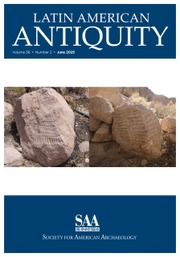Article contents
The Organization of Staple Crop Production at K'axob, Belize
Published online by Cambridge University Press: 20 January 2017
Abstract
This study examines variability in size, staple crop production, and wealth among households in the community of K'axob, Belize, from the ninth century B.C. until the ninth century A.D. Staple crop consumption and production are reconstructed from stable bone isotopes of 25 adults from 21 households. The formation of larger corporate households is documented from the spatial layout of 62 residences. Wealth differentiation is reconstructed by comparing architectural and ritual elements from 69 households. The formation of larger corporate households, the diversification of staple crop production, and the emergence of interhousehold wealth differentiation beginning in the fourth century B.C. coincided with the emergence of regional elites. However, changes in household size and staple crop production should be understood in terms of the high degree of continuity in the local agrarian economy. These findings suggest that elite political strategies had repercussions for the ways farming households managed staple crop production but that elites did not directly control production. The study also expands on current models of complex society that question the degree to which political elites directly managed the agrarian economy.
Este estudio examina la variación en el tamaño, la producción de alimentos, y la riqueza en la comunidad de K'axob, Belice, entre el noveno siglo a.C. y el noveno siglo d.C. Se reconstruyen los patrones a largo plazo en la producción de alimentos básicos usando análisis de isótopos estables en huesos de 25 adultos de 21 unidades domésticas. El estudio también analiza la organización espacial de 62 unidades domésticas. Estos análisis se enfocan en las diferencias entre casas corporativas y las demás de las casas pequeñas. Las diferencias de riqueza se reconstruyen con la comparación de los contextos rituales y los elementos arquitectónicos de 69 casas. La formación de las casas corporativas, la diversificación en la producción de alimentos básicos, y el aumento de las diferencias de riqueza coinciden con la aparición de élites regionales durante el cuarto siglo a.C. Sin embargo, estos cambios locales fueron sutiles y se deben entender en términos de la continuidad general en la economía local. Estos resultados sugieren que la política de las élites regionales tenía efectos sobre la manera en que las unidades domésticas manejaban la producción de alimentos básicos pero no parece que las élites regionales directamente manejaran esa producción. Estas conclusiones expanden los modelos de sociodades complejas que tienden a cuetionar el gracio en que las elites manejaban directamente la economía agrícola.
- Type
- Reports
- Information
- Copyright
- Copyright © Society for American Archaeology 2003
References
References Cited
- 10
- Cited by


